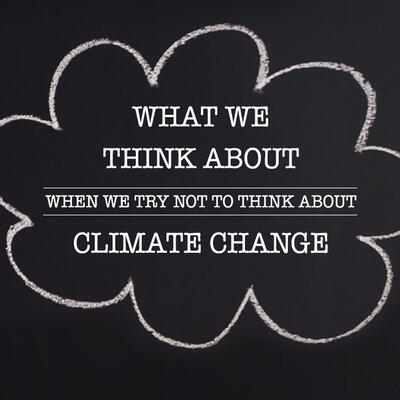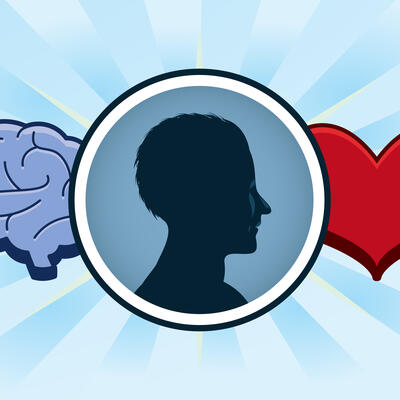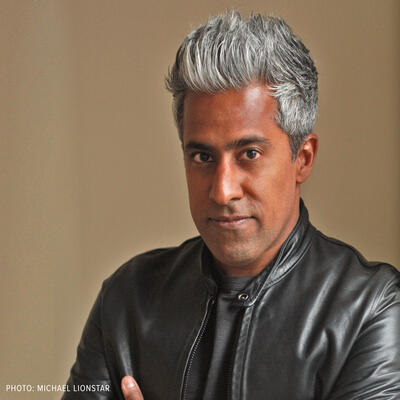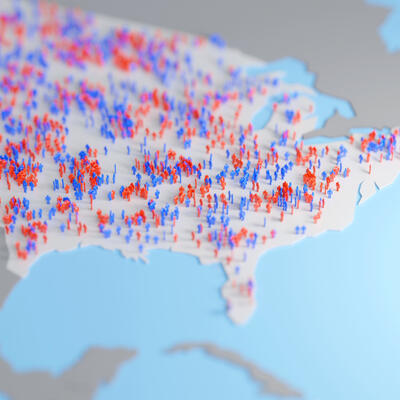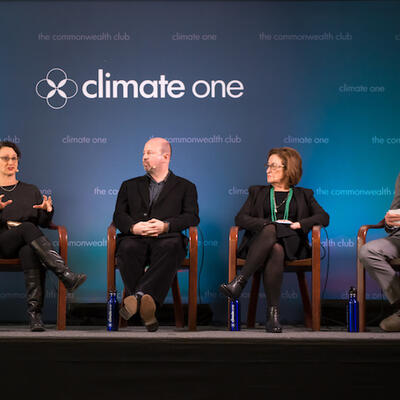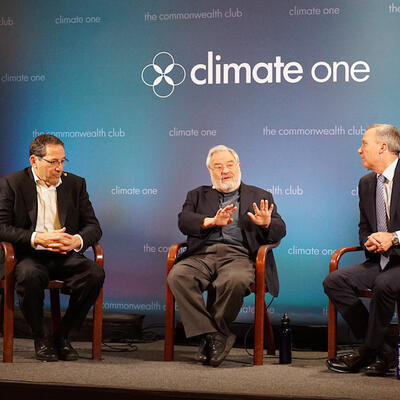
Why Facts Don’t Trump the President
Guests
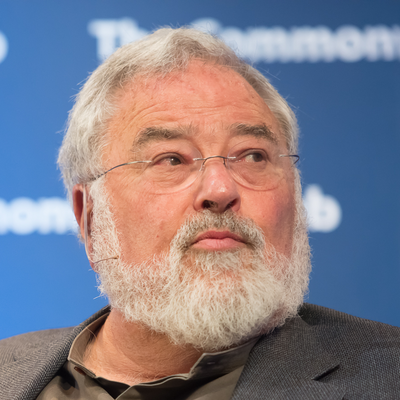
George Lakoff
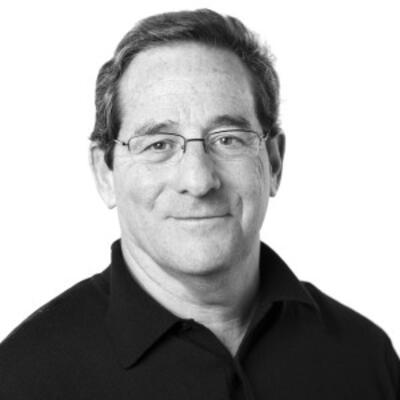
Robert Rosenthal
Summary
An information war is raging in our country, in mainstream news and on social media. What is factual and what is an “alternative fact?” Do facts even matter?
George Lakoff, Professor of Linguistics, UC Berkeley
Robert Rosenthal, Executive Director, The Center for Investigative Reporting
This program was recorded in front of a live audience at the Commonwealth Club of California on February 23, 2017.
Full Transcript
Greg Dalton: From the Commonwealth Club of California, this is Climate One, changing the conversation about America's energy, economy and environment. I'm Greg Dalton. And on the show today, we will plunge into the information war raging in our country on social media and in the mainstream news media. Fake news manufactured in Europe helped catapult Donald Trump into the White House. And since his inauguration, the news media has been struggling with how to handle statements from the president and his lieutenants. Is Donald Trump a climate denier? What is a lie? What is factual and what is an alternative fact? Liberals are focused on facts and decry the post-fact world. Conservatives pay more attention to values and narratives which are more likely to be remembered by the human brain. The reality is facts are important, but they may not be as important as you think they are. Facts often don't change hearts and minds.
Joining our live audience at the Commonwealth Club in San Francisco, we’re pleased to have with us two distinguished language and journalism experts. George Lakoff is a linguist at the University of California Berkeley where he studies how human brains process language and ideas. He is the author of numerous popular books, including “The Political Mind: Why You Can't Understand 21st-Century American Politics with an 18th-Century Brain.”
And “Don't Think of an Elephant!: Know Your Values and Frame the Debate.” Robert Rosenthal is Executive Director of The Center for Investigative Reporting which produces the Reveal radio show and other award-winning journalism. He previously was a managing editor of the San Francisco Chronicle and editor of the Philadelphia Inquirer. He was also an editorial assistant at the New York Times on the Pulitzer prize-winning Pentagon Papers project. Please welcome them to Climate One.
[Applause]
George Lakoff, we’ll get into the factual part of the brain and the emotional part of the brain, they’re connected. But first I want to go to a story and an emotional place with you. Where were you on election night 2016 and how did you feel?
George Lakoff: Well, we were having some tacos and I felt pretty bad after a while. And it wasn’t just the tacos. But what’s strange is in March 2016, I wrote a paper “Understanding Trump” which predicted that he would get 47% of the vote. And told exactly why and what he did and how he worked and why he was very smart and why he used other people's brains to his advantage. And he only got 46% of the vote but certain percentages were taken away by other candidates. And of course, the Democrats did everything they could to get him elected. So we can talk about that.
Greg Dalton: We will talk about that in a way that you'll say for example that Hillary Clinton put Trump in the middle of her campaigns. Robert Rosenthal, another emotional day I’ll ask you about Inauguration Day. Where were you and how did you feel?
Robert Rosenthal: By that time I think I wasn't surprise he won. But I was listening to his words and I found them the dark side of America that I don't really see. And I was sorry that he didn't have a different message for the country and for the whole world really.
Greg Dalton: We invited a pollster, Republican pollster to join the program today from Denver who works for John McCain and other national figures. She couldn't make the trip to San Francisco we look forward to hearing from her another day. We did want to hear from a Trump voter, so we sent one of our producers to talk with one something few people in blue states and cities do these days. Although there are more Trump voters in San Francisco than you might think. Nearly 10% of voters, 37,000 people in the bluest city and the bluest state went for Trump. So let's hear from Gary Malazian and hear what he has to say about Donald Trump.
[Start Clip]
Gary Malazian: My name is Gary E. Malazian. I started out in Fresno, I went to UC Davis. I took my doctorate there in plant physiology. I turned my back on that because the politics and academia. The American people have too much time, too much money and too much freedom. And they don't know what to do with those things and San Francisco is the capital of that. The whiniest groups if you read the Chronicle are gays, Blacks, and whatever. And you can never do enough for anyone of those groups, they always want more.
The game plan in San Francisco is to kill and destroy Donald Trump. The guy hasn’t even been in office, he hasn’t put his people together yet and they’re criticizing, condemning and complaining. These folks are dropping beneath the Tea Party. They're doing the exact same thing that they accuse the Tea Party of doing, that’s not the high road.
I was gonna vote for Bernie because I think he had the message that he gave but he was up against a snake. America's biggest failing is supporting single women to have babies that they cannot afford. That brings the whole culture down. I mean I grew up in a family that disciplined their children. The problem with women who have babies without a father, there’s no discipline. It's all enabling. Fundamentally, in my head, women are nurturers and God bless them we need nurturing. Men are pioneers.
Mankind should learn to live together in peace and harmony and not combat each other. And I think that's where Mr. Trump is headed. I give me hope because I have a belief system that I haven't had to change my whole life. That gives me hope.
[End Clip]
Greg Dalton: Trump voter Gary Malazian who’s in the house tonight. George Lakoff, a lot there, nurturing mothers, yet Hillary Clinton was a snake, a lot there. How do you analyze that?
George Lakoff: Well, I wrote a book called “Moral Politics” a little over 20 years ago. Which came about by asking why do certain positions fit together? You know, conservatives say we’re gonna get rid of abortions, but we gonna have a flat tax. What’s taxation have to do with abortion? We’re gonna get rid of environmental regulations, what is that have to do with those?
Everybody should be able to own a gun, what is that have to do with any of the others, and on and on. And I figured it out finally when I realized – one of my students had written a paper – that we all have a metaphor of the nation as a family. We have founding fathers, we send our sons and daughters to war, we have on land security. And nobody says, what do you mean fathers, we have founding fathers, the nation as the family. My question is what kind of family?
And what we found was that there are two types of families, a strict father family and a nurturing parent family which corresponds metaphorically to progressive and conservative thought. But they’re not just that way. There are some people who are only one and only the other, but many people who are, what is a moderate, a moderate is somebody who is mostly one and partly the other in various ways. And then conservatives which we’ll get into in a minute have what is called in-group nurturers.
If you're in a conservative church, they’ll take care of people who are needy who are church members. If you’re in a military unit, you take care of the people in that military unit. The military takes care of its own. If, you know, lot of people who are conservative and I was brought up among them, have in-groups that they care about. It might be their family, their neighbors, their community, the people who, you know, they go bowling with or whoever. And I think it's important if that's the case because they really do take care of them. You know, you'll find when there is a fire threatening a neighbor’s home, there are these conservative guys out there manning the fire hoses. If there's a flood, they’ll be throwing the sandbags. They do care about the community seriously because it’s their in-group and that's part of conservatism.
Now there are conservatives like Trump who don't have that kind of view. He’s like total almost except for his own family. He does his family as his in-group. But aside from that, that's it. Now what is a strict father family and that's the big deal. In a strict father family, the father knows right from wrong and that gives him authority. He has to impose it. He has to make sure his kids do what he says, not do what feels good. You’ve heard about feel-good liberalism, means they don't have a strict enough father. And what it says is – what he says is that, if they don't do what he says, if they, you know, stand up to him or sass him or anything like that, don't show respect, then he’s supposed to punish them. It's called tough love. Because he loves them he has to punish them, it's his duty. And not only that, the child, if the child tries to avoid the punishment then they do what he says. And if they do that, and don't do what feels good they get disciplined. And if they have discipline, they should be able to go out in the world and be prosperous.
So what if they’re not prosperous? Means they don't have discipline therefore they can’t be moral and they deserve their poverty. So, you know, poor people are lazy. And then you have a further part and this is the big deal. If it's the case that authority and morality go together then what that says is that if that is a natural thing in the world, the way you find out who is better than who, who has, you know, better morality is by looking at who won. And so you have things like religion won out, so you have a hierarchy, a moral hierarchy of God above man. You have man above nature.
We've conquered nature. Nature is there for you, take whatever you want of it. Man above nature. You have the rich above the poor, employers above employees. You have adults above children. In 21 states, teachers and coaches who have children who don't listen to them can beat the kids with sticks. That's a law in 21 states and you can imagine the states and you’ll be right. The other part of this is you then have Western culture above non-Western culture. Has Western culture won out? And you have America above other nations. America first, man above women, whites above nonwhites, Christians above non-Christians, straights above gays. That's the moral hierarchy. Take any ultra right-wing conservative position and you'll find the place in that hierarchy. That hierarchy determines the ultra right view of the world.
Greg Dalton: Robert Rosenthal, Brendan Nyhan wrote recently at the New York Times that before the election fake news was primarily aimed at Trump voters. After the election, research shows that Democrats are more likely to believe conspiracy minded statements than a month before the election. He wrote that “losing political control can make people more vulnerable to misinformation and conspiracy theories.” I’d like to hear your thoughts on fake news and whether some people, how Democrats are just as susceptible more so now perhaps after the election.
Robert Rosenthal: Yeah, well fake news has always existed, you know, propaganda, disinformation. I think the difference today is that you have the technology to spread it instantly and through social media. And we tend to think about media and throw all newspapers, television, but media is really different than journalism.
And I think what happened with the conspiracy ideas or theories getting more traction say from the losers is because they lost and they wanted to believe something there’s an explanation. But, you know, I think the real big issue here is information and to me it almost supersedes journalism or media. That's how information is disseminated and believed, and controlled. And we are now in an information Civil War because you believe what you want to believe and you don't believe what they believe. And it's to me the potential in history for the worst things to come out in terms of autocratic dictatorships, whatever you want to call it, it always goes to the control of the information. And if you’re in an information world where the information only comes which we don't have right now from the government obviously that's the worst case scenario.
So I think it’s really important to understand that and that it's not just journalism or media, it’s the way information moves in the way it moves today and it's accelerated. And the fact is that the president now is the biggest and most influential publisher in the world through Twitter. And I think we all have to also think about that we, our brains aren't made to process information with the speed of we’re getting it today. And just think about your own lives or 20 years ago where you maybe you had a cell phone and what that device means today in terms of how you get and also receive information.
Greg Dalton: Robert Rosenthal is the Executive Director of The Center for Investigative Reporting. George Lakoff, Amanda Tabb wrote recently in the New York Times “Americans’ deep bias against the political party they oppose is so strong that it acts as a kind of partisan prism for facts refracting a different reality to Republicans than to Democrats” and she goes on to say that “partisanship is core to our identity now in a way that it didn't used to be in the past.”
George Lakoff: First of all it has been in the past to a large extent, but we never noticed it and that wasn't to this extent. But I think you have to understand something about the brain to understand what's going on here. Every idea is physical; it’s in your neural circuitry. You think with your brain, so ideas don’t float through the air. Now, what that means is that if you have an ideology, a worldview of any kind. You have lots of complex circuitry, lots of ideas. And they’re fixed they are, you know, they’re not going anywhere. Now you can only understand things that your brain allows you to understand, and that's a major point. So if you have just one worldview and by the way, I think most people have more than one at once. But if you have only one worldview, what happens when you get information and that does not fit that worldview. It may not be noticed. It may be ignored. It may be changed, you may actively change it and there are experiments that show that people do change it. It can be ridiculed or attacked.
Greg Dalton: But do facts change minds?
George Lakoff: Do facts change minds? It depends. So in these cases, facts may not change minds. And there’s a deep reason for this. If you, let’s suppose you have either a nurturant worldview, you know, progressive worldview or conservative worldview. Your very being is defined by that worldview and especially if you have a strict father worldview. It's very important that your identity, your very identity is wrapped up in that worldview. That's who you are because what is important is it defines right and wrong and you want to think you're right in everything you do, everybody does.
So the result of that is that you have an identity defined by a moral worldview. And what that means is there anything entailed by that worldview has to be truth. Your worldview must be a higher truth and anything that follows from it is and if it isn't a fact, if it isn’t out there independent of the worldview that becomes an alternative fact. The alternative facts are those things that follow from those parts of the worldview that is unchangeable that defines who you are and that there is no alternative to. Now many people are partly progressive and partly conservative and we’ll go there in a while.
But I think the main thing is that the idea of an alternative fact relative to Trump who has I think virtually just a strict father worldview with the exception of maybe his family, that's it. I mean, and what happens is if you have that worldview then certain things must be facts or else your whole identity goes. And that's I think true of a lot of Trump supporters of the strong Trump supporters who will take lies. Suppose there are facts out there and they’re told lies. Well, the lies are not as important as the truth that defines who they are. And not as important as the truth that defines who they are, and that is very important. That's why you can say oh he's a liar, he's a liar and a liar and it won't matter.
Greg Dalton: Robert Rosenthal, there’s quite a bit of discussion journalism, when to call a lie, a lie. How are you handling that and all these shades of lies and mistruths, falsities?
Robert Rosenthal: Well, you know, we’re not producing content every day. And I think, you know, investigative reporting is deeply fact-based.
It's based on documents, on the record sources, and everything we do goes to tremendous legal betting because we get sued and we get prior to publication very often, threats either from corporations, individuals through attorneys. So we really believe we’re fact-based. But I think if I was running a newspaper like I once did, I think you’d have to call it out. But I also think that this question of facts, they don't matter if your belief system doesn't accept them. Because your emotion, your belief system and you go back to, you know, again whole societies that were moved not by facts, but by information, propaganda that the masses went along with. And if you stood up to the facts, you were punished and you’re an outsider, you are excluded.
I think that in the country today we are split obviously. And it is probably bigger, call it the middle or movable middle who might react to facts. Who are also quite emotional and driven by the emotions that want to believe sort of the best thing or the better things. And also, you know, the framework of what American democracy means and what American culture is and the uniqueness of American society as it’s evolved is something that I think a lot of people hold onto. I also think that right now the conversation of people are gonna come together again. There are places where values will be met. You know, George mentioned, you know, in a military, I'm not sure it's a conservative value but I would call it more of a team value, you have a common purpose. You have a goal, you’re under threat, you're coming together no matter who you are, what your politics are. And that’s some of the strongest bonding you can have. That happen in sports that happen in the right environment, on a business or in a University when you have a common goal, you share. We’re fractured right now.
And the other thing I think that’s really complicated, that's different in today also with especially with speed of information, the ability to watch things. People are confused about what is opinion and what's journalism or facts in the way the business models for Fox or MSNBC and others have evolved is about being counter, totally counter, and having a pure political point of view and agenda. And people watch that I remember watching something the BBC did recently with a bunch of Trump supporters in Arkansas. And one woman was sticking to something which was completely not true and the person interviewing said here are all the facts, she said, but I read it on the Internet, you know, like that's God's word. So again, people believe the sources they want to believe. And that's really something that I don’t think any of us have an answer to in this divided fractured Civil War we’re in.
Greg Dalton: President Donald Trump held a press conference to announce his new nominee for Secretary of Labor and it quickly morphed into an all-out attack on the press. Let's take a listen.
[Start Clip]
Donald Trump: Unfortunately, much of the media in Washington DC along with New York, Los Angeles, in particular speaks, not for the people, but for the special interests and for those profiting off a very, very obviously broken system. The press has become so dishonest that we if don't talk about it, we are doing a tremendous disservice to the American people, tremendous disservice. We have to talk about it to find out what's going on because the press honestly is out of control the level of dishonesty is out of control.
[End Clip]
Greg Dalton: Robert Rosenthal, you and your profession out-of-control?
Robert Rosenthal: No, I think, you know, when President Trump the other day said, you know, the enemy American media is the enemy, the American people, this is, you know, out of the playbook of the worst leaders in the history of the world and it's extremely dangerous. And, you know, I worked on something a few years ago where Chauncey Bailey who was an African-American journalist, was assassinated, you know, on the street of Oakland when he went to work one day. And I was part of a team of people who actually did stories that led to the killers who are now in jail. So journalists, you know, law enforcement, the military journalists are maybe one of the other professions in the world where they’re targeted and killed and put in jail and in silenced because of their work. And obviously this country and the founding fathers understood the role of a free press.
So I find that personally appalling and as a journalist really threatening and it's gonna lead to things – there are consequences for words and information. And I think, you know, that’s something whatever your politics are it's really something to think about in terms of what this country is based on.
Greg Dalton: George Lakoff, you know, making the enemy, calling the press the enemy of the state or enemy of the people.
George Lakoff: Look, the press did something really dumb after that happened.
They came out with a Twitter feed, “not the enemy of the people,” right. It’s like, you know, Nixon said “I am not a crook” everybody thought he was a crook. I wrote a book called “Don't Think of an Elephant” what would you think of, an elephant. You know, not the enemy even you think of them as the enemy. You know, I came out the next day and I wrote a piece again the Twitter feed of protect the truth and explained why that was. And the reason is very simple, in order to negate something, you have to activate in your brain what is being negated, right. And every time you activate something in your brain, it becomes stronger. So the more you negate something the stronger it gets. And you find lots of progressive TV shows and so on where they will constantly take some outrageous things said on Fox News and then they'll negate it. They’ll repeat it, negate it and repeat it and negate it thus helping the other side all the time.
Robert Rosenthal: I just want to follow-up. I think, I agree but I think that was an incredibly shrewd thing he said actually, because whatever the follow-up was on we’re not the enemy. But what he’s really doing is setting, laying the groundwork and it’ll happen over and over and over again. For the whatever is critical of him is not to be believed, and it's your enemy. It's not my enemy, it’s your enemy. So this information, the story, so going forward, and I think there will be a lot more coming that was critical. He’s gonna remind people, don't believe it, don't believe it, don't believe it. They are the enemy, they lie. So that's gonna be the constant refrain is the messaging also, it's not just the one statement, it will be a continual theme going forward and for the people who think the press is the enemy anything that's critical of Trump will be coming from the enemy. Who are your enemies? Who are your enemies, what do you do to your enemies?
George Lakoff: And when he says the people he means the people who follow him. So, you know, and you got that with Pence talking to the NATO leaders who said, oh, the American people want NATO to, you know, have a bigger military. It's the American people, right. It’s not the American people, it's Trump and he stands for the people who are following him. That’s an important distinction.
There’s another very important thing about information. When Lincoln talked about a government of by and for the people, if the government is of the few people, there is no line between the government and the people and no informational line. You have information should flow in both ways. What has happened now is we now have a gag rule on the government. That is things like the EPA and the Food and Drug Administration is on are not allowed to tell their results to the people. And they don't take information from it and they don't pay attention to it.
What that does is get rid of the notion of a government of the people. That truth is part of democracy, it’s part of democracy that and we never really noticed it before, we thought elections would just give us that and it’d be okay. Now we notice that the of by and for the people is really very important. By the people. The people are not billionaires. We have government by billionaires. Now, what about for the people? That has to do with caring, you know, this government was set up originally by citizens who cared about other people, worked for the government to provide public resources for everybody, whether they’re in business or private life. All those resources, you know, whether they’re roads and bridges or airports or scientific research, et cetera, is for everybody, whether you're in business and so on.
And you can't have either private life or private enterprise without that.
Now, that whole idea of public resources is being turned on its head. Republicans want to privatize everything as a public resource. You know, whether it's they want to have it, when they want to build infrastructure they want it to be owned. They want the highways to be owned, et cetera. That's what, when they talk infrastructure they don't mean public infrastructure.
Greg Dalton: If you’re just joining us, this is Climate One from the Commonwealth Club. I'm Greg Dalton. And our guests are Robert Rosenthal from The Center for Investigative Reporting and George Lakoff, the cognitive linguist from the University of California at Berkeley. George Lakoff, I want to hear your thoughts on framing as it relates to energy and climate change, people on the right talk about energy independence, people on the left talk about save the planet. So let’s get your take on that as well as climate denial and skepticism, which is something very powerful in ascendance in Washington right now.
George Lakoff: Well first of all climate deniers don't come along and say I'm gonna deny climate, you know, or I'm gonna deny science. They don't do that at all. You know, what happens is that if they have a worldview which doesn't allow that in. So a strict father worldview will have corporations, you know, who are employers above other people. And that means they can do what they want, they’re moral in that hierarchy. And therefore, they can do all sorts of things against the environment because that's okay. And so that idea of they’re doing things that are bad for the environment and for the planet doesn't enter, it can't be there.
Now, a whole lot of people who are progressives and Democrats have another form of denial and of science denial but they don’t recognize it. It has to do with the way they reason, there's a view of reason that goes back to Descartes in 1650. It says that thought is logic. Descartes, you know, was a logician he said things go by it’s logic that all thought is conscious we now know it's 98% unconscious. But it isn’t logic it has to do with framing metaphors and other kinds of metal structures. You know, and what happens is there are a lot of people who accept that. And if you believe that everybody has the same notion of thought and that it’s logic, it will follow that if you just tell people the facts they’ll all reason to the right conclusion. Now we know that that keeps being false and, you know, it's not that facts don't matter, they do matter. But what's happening is people who believe that have a false view of reason which is denying neuroscience and cognitive science. They’re science deniers of a different kind.
Greg Dalton: We’re gonna go to our lightning round at Climate One with George Lakoff and Robert Rosenthal, yes or no question. First for George Lakoff, I know this is hard for professors.
[Laughs]
True or false, George Lakoff, in the last 50 years, Americans have become more tolerant of people with different skin colors and less tolerant of people with different political views?
George Lakoff: Sort of.
[Laughter]
Greg Dalton: True or false, Robert Rosenthal. Donald Trump has been good for the business of commercial media?
Robert Rosenthal: True.
Greg Dalton: George Lakoff, Republicans are more disciplined and more skilled at messaging than Democrats?
George Lakoff: Absolutely and there’s a good reason for it.
Greg Dalton: Robert Rosenthal, in part that's because Democrats are convinced facts, truth and justice are on their side and they will prevail?
Robert Rosenthal: That’s mushy. True I guess.
Greg Dalton: Mushy, we can say mushy. George Lakoff, yes or no. A conservative brain is wired differently than a liberal brain?
George Lakoff: Yes.
Greg Dalton: Robert Rosenthal, fake news has always been here and is here to stay?
Robert Rosenthal: True.
Greg Dalton: George Lakoff, Democrats and Republicans are equally guilty of creating our nation's deep partisan divide?
George Lakoff: Yeah, I think that's true.
Greg Dalton: George Lakoff, the Affordable Care Act was poorly named because while it expanded health care insurance for 20 million Americans, it did not reduce costs?
George Lakoff: False.
Greg Dalton: This is an association question where I'll mention something and you tell me either the first thing that comes into your mind or George Lakoff, you can mention a counter frame.
So George Lakoff, tax relief.
George Lakoff: Investment.
Greg Dalton: Robert Rosenthal, death panels.
Robert Rosenthal: Life.
Greg Dalton: George Lakoff, death tax.
George Lakoff: Millionaires.
[Laughter]
Greg Dalton: George Lakoff, climate change.
George Lakoff: Invented by conservatives. Was invented by Frank Luntz, he didn’t want global warming that sounded like people were responsible.
Robert Rosenthal: You had students do this in your classroom where you ask for one word.
[Laughter]
George Lakoff: I never ask, I never do that. I would never ask students for one word. I ask them to think.
Greg Dalton: I don’t know if students ever get a word in, in his class.
George Lakoff: Oh no, no, no. The whole point is to get them to talk.
Greg Dalton: Last one lightning round. Robert Rosenthal, Kellyanne Conway.
Robert Rosenthal: Oi.
[Laughter]
[Applause]
Greg Dalton: Let’s end it there. Our thanks for the lightning round.
[CLIMATE ONE MINUTE]
Announcer: And now, here’s a Climate One minute.
The new administration has made no secret of its views on climate change. Will the rest of the country follow suit? Shortly after the election, an audience member asked the panel what catastrophic event could finally wake the nation up to the dangers of global warming. Tom Toles, editorial cartoonist for The Washington Post, gave a rather surprising answer.
Tom Toles: We’ve had massive fires, we have flooding from tornadoes, I mean from hurricanes. We’ve had tornadoes we’ve had flooding from just freak rainstorms. I have my own theory, is fires weren’t enough, flooding wasn't enough, hurricanes, tornadoes weren't enough.
That the environmental event that's going to change the understanding of this issue is when people come out of their houses and march on Washington and march on fossil fuel companies. It's gonna be a tidal wave of human beings that's what it takes right now. Everybody is gonna have to get out of their chairs and do something.
[Applause]
Announcer: That’s Tom Toles of the Washington Post, speaking about a possible major weather event on Capitol Hill. Now, back to Greg Dalton and our live audience at The Commonwealth Club.
[END CLIMATE ONE MINUTE]
Greg Dalton: George Lakoff, you did a taxonomy of Donald Trump's tweets that included the preemptive framing, hacking the DNC was the DNC's fault; a trial balloon, you know, we should expand our nuclear arsenal, as well as deflection and diversion. So explain quickly the taxonomy, the predictable taxonomy of his tweets.
George Lakoff: Every tweet is strategic and he knows exactly what he's doing in every single tweet.
Greg Dalton: So you don't buy this impulsive 3:00 am I’m just gonna like pissed off and do something, you don’t buy that?
George Lakoff: Nonsense. It's all strategic. There are four types. One, he's trying to put out a frame first so he gets to frame it before anybody else does.
Like for example, you know, he actually won the popular vote because there are 3 to 5 million illegals voting, right. That's, you know, a preemptive frame. There is a trial balloon about everybody should have nuclear weapons. Let's see what happens, you know. And, you know, for a day it was sort out there in the news and then forgotten, right. So, yeah, he can keep on saying that. They are trial balloons. Diversions all the time, you know. Yes, the question that rose about the emoluments clause and whether he should be, you know, thrown out of office because of it and prosecuted because of it. And so what does he do, he talks about Meryl Streep.
And then the media like dogs following a ball, they say, oh for three days we’re gonna show Meryl Streep and have debates about whether celebrities should be able to talk about politics and on and on. And he always controlled a diversion, almost everything he does and in fact most of the most outrageous things he does is to divert you from noticing what Paul Ryan Trump is doing.
Greg Dalton: Robert Rosenthal, what about that, media has taken the bait; they’re following the distraction sideshow from what's really going on.
Robert Rosenthal: Yeah, I agree. And I think again it’s speed if you think about 20 years ago if there was no Internet and you basically had 25 years ago your newspaper. Three networks, you had CNN. He’s taken advantage of the speed and his ability as I said earlier to be the world's largest and most paid attention to publisher. And I agree with George that a lot of that is diversion, is distraction, is trial balloons and we’re dealing with a firehose constantly. And, you know, you need to take time and really I think to consume information now you really have to go to multiple sources and I think it's really important also to go to sources you are gonna be appalled by in terms of how they're telling a story.
And it's not just the stories they’re telling. It's also what's not being reported to the other side or from your point of view. So it's the selectivity of the information they're pushing to their audience, which they know is coming to them. But I think Twitter, his use of Twitter I think is brilliant, really. He's mastered it the same way past dictators mastered other mass media. If you think about radio which, you know, what the Germans did, what Hitler did really, it was radio.
Greg Dalton: We did a poll on Twitter and we asked followers why did you vote for your candidate, 39% said I was persuaded by facts. 29% said the other person was a liar. 13% said an issue, and 19% said I voted for my party.
So there is sort of there is tribe, there are facts, there is villainization. George Lakoff, your take on those responses?
George Lakoff: Well first they thought the, you know, when you repeat crooked Hillary over and over again and it’s actually 20 years of repetition of that by Republicans. What happens is it gets into people's brains. I mean it’s heard over and over again and, you know, it doesn't matter you get to start, your brain takes it in and it becomes true. Because it’s said repeatedly and reframed as repeated is taken in unless you are constantly vigilant against it and people generally can't be constantly vigilant against it. So, yeah, they thought that Hillary was a liar, you know, when in fact she mostly wasn’t. Now, politicians occasionally lie here and there and you’re gonna get just about any politician will do that but that's different from being a systematic liar on major issues.
Greg Dalton: Robert Rosenthal, Jon Stewart changed the news biz by having a fake news show. Tell us about the power of humor and the news is so depressing that people are increasingly looking to humor and how that's, we’ll get to George Lakoff, and how that’s challenging to uphold?
Robert Rosenthal: Well, I think, you know, it's like taking medicine. And if it tastes better, you might swallow it. I think humor is crucial and I mean satire always had a huge role in societies. And I think it's important to try and today use different forms of storytelling and take advantage not only of the technology but the fact that people are so isolated when they consume most of their information to get them together. One of the things we do is we actually do plays based on some of our deeply reported investigative stories. So I think humor is crucial and obviously it's easy to consume and a lot of people got their information from Jon Stewart or Colbert now and it’s a form of humor that’s very biting. And also from the right, you have the same type of thing.
I mean some people, I don't think Alex Jones considers himself a humorist but some people watching him might be appalled but also really consumed by that. And I think one of the things again is this constant messaging that the refrain and when people who are not journalists perceive to that. Sean Hannity last night I watched him when he went to the CPAC meeting. He was basically sounded like exactly like Donald Trump, his message to that. So he’s a zephyr in the sense to that. And again, people are confused. They don't know when they watch something they think it's factual information even so opinion and fact are completely blurred and point of view really trumps everything. No pun intended.
Greg Dalton: Robert Rosenthal is executive director of the Center for Investigative Reporting. I’m Greg Dalton; this is Climate One from the Commonwealth Club. And other guest is George Lakoff, the cognitive linguist from the University of California at Berkeley.
George Lakoff, I’d like to hear your thought on humor because it's spontaneous, it's not voluntary and it’s particularly threatening to someone who's interested in authoritarian control because it’s true and it’s spontaneous.
George Lakoff: Right, because if you have authoritarian control, humor is based on embarrassment. It’s definitely based always based on why do you laugh when you’re embarrassed, right? It’s based on embarrassment and the idea of a strict father control is not to be embarrassed ever because you’re supposed to be totally in control. Now, by the way, I think somebody like Andy Borowitz who gives obviously fake news.
Greg Dalton: New Yorker writer.
George Lakoff: New Yorker writer. If you don't know Andy Borowitz, go to The Borowitz Report instantly. And what he does is tell the truth by giving a fake story. And it's a deep truth using all the kinds of mental tropes that you have, metaphors and frames and so on, but beautifully done, artistically done virtually every day.
Greg Dalton: And why do you say that Donald Trump should be called the minority president and that should be repeated, what’s your thinking there?
George Lakoff: Because that takes away his authority.
Robert Rosenthal: And legitimacy.
George Lakoff: And legitimacy. It takes away and it reminds him over and over as long as it’s said that is not legitimate.
Greg Dalton: Empathy is something we haven't talked about. Van Jones after the election did something really interesting. He went in his Messy Truth series. He went to, this is a liberal Democrat went into people's living rooms in middle America and talk to people, he had talk to and he had empathy for people who, you know, are very different than him. So Robert Rosenthal, I’d like to ask you about, you know, the role of empathy and kind empathizing with, you know, we have this elitist coastal media and the role of empathy.
Robert Rosenthal: Well I think empathy is a crucial if you want to call it tool of the best storytelling, the best journalism. You are taking, the best journalists will take you to people you don't know, you don't understand, and hopefully make you understand their world. And empathy again, is it crucial, I bet everybody in this room unless you’re a Native American, you know, your ancestors came from another country. A lot of them faced tremendous adversity, racism, you name it. And should we have empathy based on our heritage? Well, I think empathy is being sort of thrown out of the block in this divided world we’re in, divided United States. I think that again is one of the biggest threats, there is very little empathy. And I think the best journalism really needs to give voice to divided communities so you can really begin to hear and understand. I think the values question we’re talking about, there are a lot of values we share. There are other things we’re not gonna share but those values have to be understood so you can understand where someone is coming from. I think that was the biggest flaw of the election where you have, you know, the following of the campaign, but very little actually going out into the middle part of the country and really talking and listening to people.
We did a piece really early on where we went and spoke to Trump supporters all around the country. And there was this one when I heard this I thought this is why Trump is gonna win and this was last February. We talked to a guy in Nevada. He described himself as a loser and he just lost his job and he was back he said, living with his mother in a trailer, sleeping in the same bed I slept in 25 years ago. We asked him why he likes Trump and there's this long pause and he goes, he makes me feel good. When I heard that I said, whoa, and then we said, who are you gonna vote for if you don’t vote for Trump he said, Bernie, because he’ll legalize pot.
[Laughter]
Cause that made him feel good too.
Greg Dalton: George Lakoff, another emotion before we go to audience questions, fear, fear has been very effective. After 9/11, we heard Saddam Hussein, et cetera, 9/11. We’re now very fearful of ISOL or terrorist attack, even though we have a greater chance of being killed by lightning or other things. And yet fear for climate change doesn't seem to be motivating. Why are we so afraid of a terrorist attack but we’re not afraid of climate change?
George Lakoff: Alright. First of all climate change was brought in by Frank Luntz in order to, for the right because it sounded nice. Climate is like palm trees and you think of nice climates and change just happens, it’s not a personal thing. That's why the idea was that. And then the idiots who, you know, looking at global warming accepted the right-wing view. I mean unbelievable. Now think for a minute about what it is in your bodies that has to do with understanding whether it's climate change or global warming or whatever that takes you to an understanding of the planet. Why do people like to go on vacations to the ocean, to the mountains to beautiful places, why?
Because of the fact that they connect with nature. You are built to connect with nature. Why do you see the polar bear on the ice floe and you immediately connect with the polar bear on the ice floe? Why do you see these things in nature? Imagine all the possibilities of all the beautiful things that you've ever experienced the nature being taken away from you. Try to imagine that, you know, just to get you to understand nature in your body, it’s there. We are built to function in nature, we are biologically built. I can go through it if you want, but you probably don't. But there are things in your brain that connect you to nature the things in your body that connect to the nature. And we don't talk about that. We talk about something distant, as if it is the planet is something viewed from outer space, not from in your body.
Greg Dalton: This is Climate One from the Commonwealth Club and we’re talking about language and politics with George Lakoff, linguist from UC Berkeley and Robert Rosenthal, executive director of the Center for Investigative Reporting. I'm Greg Dalton. Welcome to Climate One. Let’s go to our first question. Welcome.
Female Participant: Hi, thank you so much for speaking. I was wondering if you could both speak to whether you think there is any tension between empathy and at least our perception of fact, and how we should think about navigating that both in terms of consuming media and in our interpersonal relationships with each other.
Greg Dalton: Robert Rosenthal, tension between empathy and facts.
Robert Rosenthal: I think that yeah there is a tension. And I think again we’re in this moment where depending on the source of the information the spin on what you should be empathetic for can be completely distorted and come from a different point of view. Here’s an example. Hate crimes are being reported, you know, increasing et cetera and there might be a story about a victim of a hate crime. Breitbart News if you follow it does not report hate crimes happening. What they report on is any hate crime that is debunked. So that is not gonna create empathy, it might create empathy for the policeman or the investigators who debunked it.
So you’re taking the same, something is happening but you're telling the story or reporting it from completely different points of view. And I think that the use of empathy in storytelling a victim who’s been shot or harmed, in an attack in this country, you will feel empathy for and that will be used one way. How much empathy do we have in our news reporting of a place where American drones or airstrikes have killed 40 people? We don't know about these people, so there’s very little empathy there, the other. So again I think this is really central part of information gathering and how it’s disseminated.
Greg Dalton: Let’s go to our next question. Welcome.
George Lakoff: Can I respond to that?
Greg Dalton: Sure.
George Lakoff: On empathy. There are several forms of empathy, one of which is in order for me to describe conservatives I have to put myself in their shoes. There’s a form of empathy of understanding someone else who is very different from you, has different values from you but you need to understand. Understanding is one form of empathy. There are other forms of empathy as well. Not just, you know, feeling bad for someone but shifting a point of view. Take the word regulation. The word regulation is from the point of view of corporations. If you go look online with regulations it’s all stuff that the corporations have put there. And what does it mean when for a corporation, it means there’s government overreach that has taken away its freedom that has burdened it and that is costly. So we need to get rid of regulations.
Why are regulations there? They’re there to protect the public. Every regulation is a protection. If you shift the viewpoint from the corporations who can do whatever they want to harm people to the people who are harmed, to the public, that shift of view changes things and it’s the empathy for the public rather than for the corporations that is involved here. So what I recommend in each case is look at the viewpoint from which the framing takes place and shift the viewpoint to the public.
Greg Dalton: Let’s go to our next question. Welcome to Climate One.
Female Participant: Hi my name is Daniela, local climate organizer and I have some framing questions about climate change. I was wondering whether you think that it would be effective to rebrand people who speak about climate science with an accepting point of view but don't take any bold action on it to rebrand them as climate deniers since they know the facts but don't take action.
Greg Dalton: We call that climate denial light, people who drive a Prius but aren’t doing as much about it as they could. George Lakoff, briefly.
George Lakoff: Not that they’re deniers. They are people who, you know, don't have the courage of their convictions, period. And, you know, there’s not a nice single word for that. But it’s not having the courage of your convictions.
If you have convictions you should be acting on them; that's what they're about. They’re not just things you say, oh I have this conviction and oh okay, I’ll sit around and now have another conviction. I mean if you really have a calling, if you have a conviction that has to be in your heart, in your body and you can't not act on it. It’s not just courage; it is just the idea that your body requires you to act on it. If your conviction is embodied, if it's in you, you act.
Greg Dalton: I talked recently yesterday with a person very concerned about climate change who said they’re gonna get a new car. I said, oh you’re gonna get electric car? No, I’m gonna buy a Jaguar. Oh, I guess you’re not so concerned. Let’s go to our next audience question.
Male Participant: Hi my name is Andy Raskin. I work on messaging, but with CEOs and leadership teams in Silicon Valley. And I was curious, so Professor Lakoff you mentioned that you thought that conservatives were better, inherently better at messaging and you said you get to that, we didn't get to it. I'm curious to hear why.
George Lakoff: Very good reason for it. If you're a conservative, you go to college what do you study? Probably some business courses. In that curriculum there’s a course called marketing. What do marketing professors study? My field, cognitive science that is. They study the way that people really think in terms of frames, metaphors, images, narratives and emotions, right. That's what's in marketing and in repetition the way, you know, how repetition works in advertising. You repeat, repeat, repeat, right. That is the way they’re taught and they learn it, it’s second nature that they get to market their ideas.
If you are a progressive you go to college, you’re interested in politics what do you study? Political science, law, public policy, economic theory, right. Those fields have a different view of reason. It's a view of reason from Descartes in 1650 that says all thought is logic. It's all conscious, you know, and it’s all traditional rationality defined in terms of Cartesian reasoning from 1650. It denies the fact that thought is 98% unconscious, that it's physical, it's in your brain, that you need to know something about neuroscience to understand it, and so on. In short, what happen is my institutions, the universities, are miseducating progressives.
Greg Dalton: As we wrap up, we’ve been talking, this is Climate One we haven't talked a whole lot about climate change. But Robert Rosenthal, is climate change getting the kind of coverage that you think it deserves in the mainstream news media?
Robert Rosenthal: No. It's been no, you know, it’s been usurped. I mean we talked earlier by the firehose that's coming out of Washington right now. And no, and I think, though it will take really big disasters. And I think one of the challenges how the people besides feeling hot or watching, you know, the tides rise, it hasn’t really affected them and we go and talk about that versus the fear of a terrorist. And I think one of the challenges again is to create empathy for the things that will be in general from climate change or the change in environment wherein the risks we all face that. And it's again, it’s the future we’re in the moment now. The moment is fixating all of us.
Greg Dalton: Right. And climate change seems far away in time and space even though we have lots of examples of it. George Lakoff.
George Lakoff: Take disasters, right. We don't talk about global warming floods, we don't talk about global warming droughts. We don't talk about global warming fires.
We don't talk about global warming, hurricanes, tornadoes, et cetera that are systemically caused by global warming. We need to be able to say okay, here are the causes; we should have a little app that tells you in cartoon form what the sequence of causes is for every weatherman for free, right. Because until you say this is a global warming hurricane, you are flooded out of this because of the use of gas and oil and coal, right. You know, until you say things like that in public over and over again, you’re not gonna get it.
Greg Dalton: Good suggestion for the journalists who are in the audience today. If you’re just joining us, we’re talking about climate change and language and politics with George Lakoff, professor at the University of California, Berkeley and Robert Rosenthal who’s the executive director of the Center for Investigative Reporting.
We’re gonna end here, we’ve been talking about fake news propaganda, alternative facts and journalism in a divided America. You can hear a podcast of this and other Climate One programs wherever you podcast and watch videos about energy, food, water, clean energy and global warming events at climateone.org.
Thank you all for coming here at Climate One in San Francisco. –Let’s thank our guests again.
[Applause]
[End]
